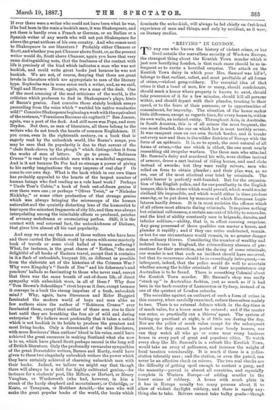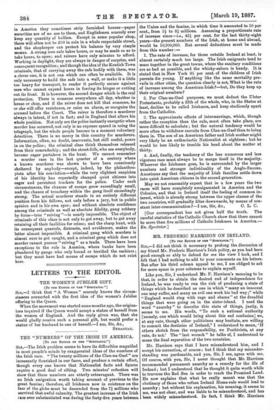" REIVING " IN LONDON.
TOany one who knows the history of violent crime, or has lived outside the marvellous security of Western Europe, the strangest thing about the Kentish Town murder which is just now horrifying London, is that such cases should be so in- frequent as to excite a horrified surprise. The attack on the Kentish Town dairy in which poor Mrs. Samuel was kirel, belongs to that earliest, safest, and most profitable of all forms of crime,—violent gang-robbery. The essential idea of that crime is that a band of men, few or many, should confederate, should mark a house where property is known to exist, should take possession of it for a few minutes, should kill all persons within, and should depart with their plunder, trusting to their speed, or to the fears of their pursuers, or to opportunities of concealment, for impunity. The situation of the house makes little difference, except as regards time, for every house is, within its own walls, an isolated entity. Throughout Asia, in Australia, in South America, this is of all crimes the most frequent, the one most dreaded, the one on which law is most terribly severe. It was rampant once on our own Scotch border, and it breaks out every now and then in the wilder districts of Europe with the force of an epidemic. It is, so to speak, the most natural of all forms of crime,—the one which is oldest, the one most nearly resembling old irregular warfare. The three men who attacked Mr. Samuel's dairy and murdered his wife, wore clothes instead of armour, drove a cart instead of riding horses, and used clubs instead of swords ; but they were really reivers, men who relied on force to obtain plunder ; and their plan was, as we see, one of the most effectual ever tried by criminals. The public horror is perfectly well-founded. But for the organisa- tion of the English police, and for one peculiarity in the English
temper, this is the crime which would prevail, which would render civilised life impossible, and which would either in time produce anarchy, or be pat down by measures of which European Legis- latures hardly dream. It is in most societies the offence which of all others most attracts daring criminals. It requires nothing but criminal callousness, a certain amount of fidelity to comrades, and the kind of ability constantly seen in brigands, deceits, and inferior soldiers,—ability, that is, to effect cunning surprises. Any gang possessed of those qualities can master a house, and plunder it rapidly ; and if they can retire undetected, remain, or but for one circumstance would remain, in no greater danger than ordinary thieves. Considering the number of wealthy and isolated houses in England, the extraordinary absence of pre- cautions for their protection, and the daring of some criminals, our wonder is not that such an incident should have occurred, but that its occurrence should be so exceedingly infrequent,—so infrequent, indeed, that the police would do well to ascertain whether among the bolder criminals of their acquaintance any Australian is to be found. There is something Colonial about the Kentish Town murder. Mr. Samuel's shop was really "stuck up" in Australian fashion, just as much as if it had been in the back.country of Launceston or Sydney, instead of in one of the quietest of London suburbs.
The securities against an outburst of such a form of crime in this country, when carefully examined, reduce themselves mainly to two. There is no external defence which in the day-time is of much value, for a house must be entered ; and if the master can enter, so practically can a thieves' agent. The system of locking-up practised at night, is of little use during the day. Nor are the police of much value except for the subsequent pursuit, for they cannot be posted near lonely houses, nor can they watch all who go or come near every business house in every part of great and populous cities. To watch every shop like Mr. Samuel's in a suburb like Kentish Town, would take an army of policemen, and increase the weight of local taxation uneadarably. It is much if there is a police. station tolerably near ; and the station, or even the patrol, can never be an effective cheek on reivers. The two real checks are the difficulty of getting spoil enough to content a gang, and the necessity—proved in almost all countries, and especially complete in Western Europe—of adding murder to the lesser crime of robbery. A house with much plate in it has in Europe usually too many persons about it to allow of violent daylight robbery, and there is rarely any- thing else to take. Reivers cannot take bulky goods—though
in America they sometimes strip furnished houses—paper securities are of no use to them, and Englishmen scarcely ever keep any quantity of bullion. Except in some popular shop, there will often not be £50 in coin in a whole respectable street, and the shopkeeper can protect his balance by very simple means. A strong iron safe takes hours, or may be made so as to take hours, to open; and reivers have only minutes to afford. Working in daylight, they are always in danger of surprise, and consequent recognition; and though the idea bf the Kentish Town criminals, that of carrying away the safe bodily with them, was a clever one, it is not one which can often be available. It is only necessary to build the safe into a wall, or make it a little too heavy for transport, to render it perfectly secure against men who cannot expend hours in forcing its hinges or cutting out its front. It is however, the second danger which is the real protection. There is someone everywhere all day, whether in house or shop, and if the reiver does not kill that someone, he or she will offer resistance, or raise an alarm, or recognise the accused before the Court. The reiver is therefore a murderer always in intent, if not in fact; and in England that alters his whole position. Not only are the police instantly energetic when murder has occurred, not only is no expense spared in using the telegraph, but the whole people become in a moment voluntary detectives. There is no mercy in this country for murderers. Information, often, no doubt, inaccurate, but still useful, pours in on the police ; the criminal class think themselves released from their comradeship ; and the street.folk, who see everybody, become eager partakers in the hunt. We cannot remember a murder case in the last quarter of a century where a known murderer was shown to have been consciously sheltered by anybody—except, indeed, by the philanthro- pieta after his conviction—while the very slightest suspicion of his identity has repeatedly changed quiet citizens into eager and persistent trackers for the police. Under such circumstances, the chances of escape grow exceedingly small, and the chance of treachery within the gang itself exceedingly strong. The actual murderer stands in an entirely different position from his fellows, not only before a jury, but in public opinion and in his own eyes; and without absolute confidence among the criminals as well as absolute fidelity, gang robbery by force—true "relying "—is nearly impossible. The object of criminals of this class is not only to get away, but to get away retaining all their facilities for crime; and the sharp hunt, with its consequent quarrels, distrusts, and avoidances, makes the latter almost impossible. A criminal gang which murders is almost sure to get caught, and a criminal gang which does not murder cannot pursue " reiving " as a trade. There have been exceptions to the rule in America, where banks have been plundered by gangs who only bound or terrified the cashiers ; but they must have bad means of escape which do not exist here.



































 Previous page
Previous page